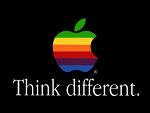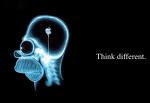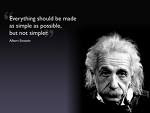Learning to think differently
 As a marketer, I am always on the lookout for people who think and act differently. A part of my gestalt, my personality, I associate with people who think differently. Sometimes, that means being the contrarian or the devil’s advocate in a conversation. At other times, it just means looking at issues using different filters. Of course, thinking differently only happens in spurts and in certain arenas. There is plenty of good sense in thinking normally too. However, for the breakthrough ideas, putting on the rose-tinted glasses — or a re-wired thinking cap — is invaluable.
As a marketer, I am always on the lookout for people who think and act differently. A part of my gestalt, my personality, I associate with people who think differently. Sometimes, that means being the contrarian or the devil’s advocate in a conversation. At other times, it just means looking at issues using different filters. Of course, thinking differently only happens in spurts and in certain arenas. There is plenty of good sense in thinking normally too. However, for the breakthrough ideas, putting on the rose-tinted glasses — or a re-wired thinking cap — is invaluable.
How does one actually come to think differently?
 I cannot declare whether one is born to think differently or whether such a disposition is acquired at a given moment or simply over time. Using Apple products alone certainly won’t cut it, although I truly believe it has helped me as I have had to relearn lots of new functionalities (having crossed over from the PC world). However, that is only a recent transition for me. My journey into the world of thinking differently began more precisely when I was at University. And there were exactly three elemental building blocks which helped craft my propensity to think differently — each stemming from one central thought: Discover what you do not know. Being aware of what you don’t know is already a challenge because, you might say, how do I know what I don’t know if I don’t know it exists?
I cannot declare whether one is born to think differently or whether such a disposition is acquired at a given moment or simply over time. Using Apple products alone certainly won’t cut it, although I truly believe it has helped me as I have had to relearn lots of new functionalities (having crossed over from the PC world). However, that is only a recent transition for me. My journey into the world of thinking differently began more precisely when I was at University. And there were exactly three elemental building blocks which helped craft my propensity to think differently — each stemming from one central thought: Discover what you do not know. Being aware of what you don’t know is already a challenge because, you might say, how do I know what I don’t know if I don’t know it exists?
The three areas I became attached to studying were:
1. Women’s Studies.
In minoring in Women’s Studies at Yale University, little did I know I would end up working in a cosmetics company, serving primarily female customers. I fell into the subject of Women’s Studies via literary criticism; but I kept on taking more classes in a more or less direct pursuit to understand better the other 50% of the population. And no, it was not a pick-up ploy–not exactly the right environment in any event. More importantly, by studying Women’s Studies, I became aware of the study of all minorities — and how minorities are frequently obliged to think and act differently to succeed. Via Women’s Studies, I was opened to a whole new world of literature and literary criticism, fascinating insights into the differences between the sexes, the politics of touch (Nancy Henley’s landmark essay) as well as the interplay of females and males in groups (at all ages). I also embraced Jungian philosophy and my anima. I did not know how much, at the time, this minor would take on major importance in my career.
2. Sleep

As a rule, we tend to study all things conscious. Whether it’s history, literature or sciences (each basically through the eyes of men), the focus of our daily lives is what we know and do during our waking day. Thus, when I came across the study of sleep as a subject at university, I was enchanted: an opportunity to learn about the other 1/3 of our day. Certainly, there can be interest in understanding one’s own dreams — though, typically not given much credit in academic circles (nor for university degrees). But the subject of sleep is much more profound, including sleep disorders, sleep patterns… There are plenty of important questions that should concern everyone. For example, how much sleep do we REALLY need? Why do we sleep? On this question, scientists are still arguing (as regards adults). The science of sleep and the work of FSRs (famous sleep researchers) such as the giant apple seed and jazz man, William (“Bill”) C. Dement, is a completely undervalued field. I tip my hat to Professor Mark Rosekind for enlightening me on this fascinating part of our existence. I highly recommend any students out there to seek it out; you can start with Dement’s “The Promise of Sleep.” In the meantime, I can also recommend reading one of my favourite books “L’Art du Temps” or, in English, The Art of Time (by Jean-Louis Servan-Schreiber) which provides a shortcut view to how I manage my sleep and my philosophy with regard to time management more broadly speaking.
3. Left-handers
 I am not left-handed and left-handedness is not exactly a “subject” in the same sense as Sleep or Women’s Studies. Left-handers are not unique — concerning apparently about 7-10% of the population (but they certainly get my attention on the tennis court). Neither is being left-handed a sign of a genius, although there are some wonderful examples, including Albert Einstein, Michelangelo (retrained right), Isaac Newton (the original Apple man), Charlie Chaplin, Benjamin Franklin, Bobby Fischer, John McEnroe to name a few. And, it’s worth noting that Apple chose a whole raft of southpaws — including Pablo Picasso, Jim Henson, Bob Dylan, Jerry Seinfeld and Einstein — for their Think Different campaign. Interestingly, we have been fielding more frequently left-handed presidents in the US since Gerald Ford: four of the last six! In the history of the USA, there have been a total of seven lefties in the White House (6 coming in the last century) out of a total of 43 (i.e. 16%). At this time, it should be noted that that both John McCain and Barack Obama are left-handed (read here about Washington Post’s “Left-Handed Conspiracy“). There is a good body of research done on left-handers, indicating that lefties have a propensity to be more into visual arts. Also, according to this 2005 ABC report, there is the suggestion that being left-handed can entail some health hazards, too. (See also “Brains that work a little bit differently” by Bragdon and Gamon). But, what has always attracted my attention is that left-handers need to operate in a right-handed world. When I imagined my wife before even meeting her, I always thought that she would be left-handed. It turns out that she is absolutely right-handed, but created two sterling left-handed children.
I am not left-handed and left-handedness is not exactly a “subject” in the same sense as Sleep or Women’s Studies. Left-handers are not unique — concerning apparently about 7-10% of the population (but they certainly get my attention on the tennis court). Neither is being left-handed a sign of a genius, although there are some wonderful examples, including Albert Einstein, Michelangelo (retrained right), Isaac Newton (the original Apple man), Charlie Chaplin, Benjamin Franklin, Bobby Fischer, John McEnroe to name a few. And, it’s worth noting that Apple chose a whole raft of southpaws — including Pablo Picasso, Jim Henson, Bob Dylan, Jerry Seinfeld and Einstein — for their Think Different campaign. Interestingly, we have been fielding more frequently left-handed presidents in the US since Gerald Ford: four of the last six! In the history of the USA, there have been a total of seven lefties in the White House (6 coming in the last century) out of a total of 43 (i.e. 16%). At this time, it should be noted that that both John McCain and Barack Obama are left-handed (read here about Washington Post’s “Left-Handed Conspiracy“). There is a good body of research done on left-handers, indicating that lefties have a propensity to be more into visual arts. Also, according to this 2005 ABC report, there is the suggestion that being left-handed can entail some health hazards, too. (See also “Brains that work a little bit differently” by Bragdon and Gamon). But, what has always attracted my attention is that left-handers need to operate in a right-handed world. When I imagined my wife before even meeting her, I always thought that she would be left-handed. It turns out that she is absolutely right-handed, but created two sterling left-handed children.
So, what does this mean… at least, in the business world?
For one, I believe that having been attuned to these different topics throughout my adult life is part of how I have cultivated what is described as a “Whole New Mind” (in the book by Dan Pink and highly recommended reading), essentially a balanced right/left brain. In turn, this has been useful in coming up with new ideas and strategies. And finally, most importantly, it has led me to be more mindful of diversity. Whether international, unorthodox or just different, having opposing or alternative thinking people in your team is healthy and enriching. It also requires differing management styles to make the most of their talent. What are other areas of study that can procure “think different” mentalities? I’d love to hear your stories.
Others blogging on “think different”:
Mahmudahsan – with some English proverbs
Mackinnon on Think Differently – although this looks sadly like a dead blog.











Concernant la portion Think Differently, je proposerais humblement l’ajout d’un élément de naïveté contrôlée, à celui de la curiosité et des lunettes roses dont tu faisais déjà mention. À moins que par « lunettes roses » tu y fasses déjà référence…. Ma définition toute personnelle d’une naïveté contrôlée est celle qui permet un détachement temporaire de la réalité chronique mais nécessaire, permettant pour quelques précieux instants, d’exercer une pensée créative canalisée sur un sujet et son environnement. Il faut donc, avec aucune crainte du jugement des pairs, explorer le sujet en émettant des hypothèses différentes et cassantes. Trouver des interlocuteurs, en particulier sur les lieux du travail, avec qui exercer cette naïveté contrôlée afin d’en insérer les meilleures éléments dans le contexte de la réalité quotidienne est un événement rare. Tu en fais définitivement partie.
congratulations on your blog, how on earth you find time to write it is mind boggling.
Loving receiving your stuff. You write beautifully.
Excellent des la premiere lecture en diagonale!
Mais est-ce vraiment sincere ou un tantinet demagogique 🙂
I think we all possess this high potential that can lead us to happiness (or at least to more happiness). And I now know that it starts with the fact to accept (and want) to “think differently”. You know, when I taught French for a year in the US (1999-2000), I realized for the first time in my life that on the US maps, Europe was not in the center; America was. And this was kind of weird and interesting at the same time. I was used to see Europe in the center! I’ve been lucky enough to travel the world, and know that you learn a lot from others; especially when you come to meet with foreign people/cultures. This definitely helped me discover that things could be different. Open your mind… And I loved and still do love this idea. I share your idea that “Being aware of what you don’t know is already a challenge because, you might say, how do I know what I don’t know if I don’t know it exists?”; And if you do not come to or search for other points of view, how do you want to enrich yourself and evolve?
@francois: definitely think that it is with a certain naivete that we are able to stay more positive and open to new ideas. Nice point.
@matthieu: what is for sure is that I did not set out to “think differently” — this is more like a retrofit.
@a-l: the splendours of travel to help us appreciate what we have that is good chez nous as well as to open our eyes and minds to the wonderful opportunities that exist further afield.
Check out the perceptive abilities of those with colour blindness – my son being acutely red green colour blind has been something of an eye opener for me.
He has remarkably acute grey scale vision compared to most anyone I’ve met. Also he is still right about green versus red about 90% of the time, but he is using other things to determine what the colour ought to be…. Movement acuity is very very high too.
Ok Minter
Follow this : I write left handed , play football right footed , play squash left handed , golf right handed , use a knife and fork right handed, throw a ball left handed, play cricket right handed is it any wonder people are confused when they meet me !!!!
As usual an interesting and provocative piece! It happens that Apple corporate is literally down the road from us and we are hardcore Mac users and fans; and it really is about more than just technology . . . the “think differently” gets to the conceptual approach that “differentiates” Apple from much of the rest of the world.
Your thoughts are interesting as it addresses the “thinking” aspect and the many cognitive assets available to us (we even use some of them!) to stimulate creativity. You may find it interesting to explore Todd Siler’s work; fascinating, talented guy that I have met at some meetings. You will appreciate his divergent and integrated thinking in regards to creativity, ‘genius’ and art.
I enjoy reading your blog and find your commentaries stimulating!
Being left handed, having one left handed child, two left handed brothers and one left handed grandchild…we get it. It definitely broadens your marketing perspective.